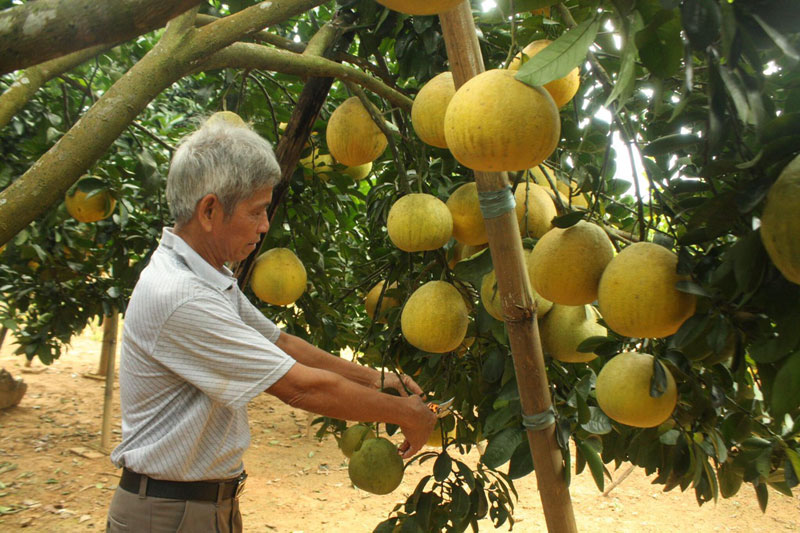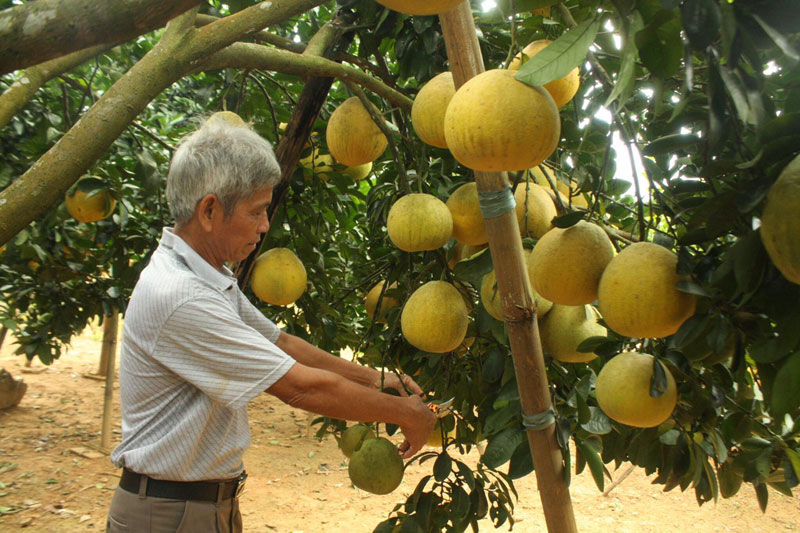
(HBO) – The Department of Agriculture and Rural Development in collaboration the People’s Committee of Cao Phong district held a conference on October 7 to design a plan to organise a trade fair and exhibition on products of the One Commune-One Product (OCOP) Programme in the northern mountainous region and the Cao PhongOrange Week 2020.
The conference drew leaders of the Department of Agriculture
and Rural Development and sub-department, Cao Phong district People’s
Committee, and relevant offices and agencies.
 Tan Lai villagers in
Dong Lai commune of Tan Lac district prepare red-flesh pomelo to introduce at
the event.
Tan Lai villagers in
Dong Lai commune of Tan Lac district prepare red-flesh pomelo to introduce at
the event.
The fair-exhibition and Cao Phong Orange Week aims to popularise
and promote agricultural products in general and citrus products of Hoa Binh,
as well as OCOP products and high-quality agro-forestry-fisheries products of
Vietnam to domestic and foreign markets.
The event is expected to support the implementation of a
programme to develop citrus plants and OCOP programme in northern localities.
It also creates a chance for localities to meet for economic
exchange, trade and investment promotion and seek opportunities to strengthen
regional connections in agricultural development.
The event is slated for November 6-11 at the Cao Phong
district cultural centre in Cao Phong town. It expects the participation of
representatives ofdistricts, city and enterprises as well as co-operativesof
the province and regional localities.
Products to be introduced at the event include major farm
produce of the localities and OCOP products, citrus products, processed food,
agricultural equipment, and handicrafts.
The fair will have 200 booths, including 68 for product
exhibition and sale, 110 for general trade, 20 food courts,and two for the organisation board and security force./.
According to data from the Hoa Binh Provincial Party Committee, the industrial production index for the first six months of 2025 is estimated to have increased by 20% compared to the same period last year. This marks the highest year-on-year growth rate for this period since 2020.
In the first six months of 2025, Hoa Binh province’s export turnover was estimated at 1.145 billion USD, marking an 18.11% increase compared to the same period in 2024. Import turnover was estimated at $ 804 million, a 17.15% increase, which helped the province maintain a positive trade balance.
The lives of the ethnic minority farmers in Tan Lac district have gradually improved thanks to the new directions in agricultural production. This is a testament to the collective strength fostered through the professional associations and groups implemented by various levels of the district’s Farmers’ Union.
With the motto the "product quality comes first,” after nearly one year of establishment and operation, Muong village’s Clean Food Agricultural and Commercial Cooperative, located in Cau Hamlet, Hung Son Commune (Kim Boi district), has launched reputable, high-quality agricultural products to the market that are well-received by consumers. The products such as Muong village’s pork sausage, salt-cured chicken, and salt-cured pork hocks have gradually carved out a place in the market and they are on the path to obtaining the OCOP certification.
In the past, the phrase "bumper harvest, rock-bottom prices" was a familiar refrain for Vietnamese farmers engaged in fragmented, small-scale agriculture. But today, a new spirit is emerging across rural areas of Hoa Binh province - one of collaboration, organisation, and collective economic models that provide a stable foundation for production.
Maintaining growing area codes and packing facility codes in accordance with regulations is a mandatory requirement for agricultural products to be eligible for export. Recently, the Department of Agriculture and Environment of Hoa Binh province has intensified technical supervision of designated farming areas and packing facilities to safeguard the "green passport" that enables its products to access international markets.



 Tan Lai villagers in
Dong Lai commune of Tan Lac district prepare red-flesh pomelo to introduce at
the event.
Tan Lai villagers in
Dong Lai commune of Tan Lac district prepare red-flesh pomelo to introduce at
the event.